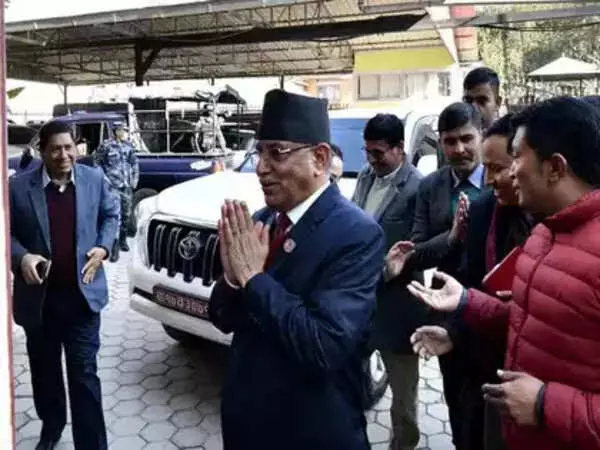
Indian investments are sought by Nepal PM in IT, mining, agriculture, other sectors
text_fieldsNew Delhi: Prime Minister Pushpa Kamal Dahal "Prachanda," claimed on Thursday that there are several economic prospects for those who are willing to invest, and he requested Indian investments in a number of industries, including infrastructure, information technology, tourism, manufacturing, agriculture, mining, and manufacturing. He claimed that Nepal is a prime investment destination due to its wealth of natural resources, sizeable human capital pool, and potential market with sound policies and regulatory framework.
"No countries other than Nepal and India share such an intimate friendship and deep-rooted cultural affinity providing an excitingly favourite business environment. Moreover, the two governments are moving ahead with bold decisions to transform the development landscape. This needs to be echoed by the private sector which is a powerful engine of growth," he said here while addressing CII's India-Nepal Business Summit.
Opportunities for investments across a wide range of areas including mining, manufacturing, agriculture, energy, tourism, infrastructure and hospitality industry is here.
He also said that Nepal's foreign investment policy is liberal and forward-looking and it has opened almost every sector for overseas investments.
"Nepal is a virgin land for investment. We are still at a nascent stage of industrialisation. Investment in every sector is profitable," the prime minister said, adding Nepal offers low customs duties, a simplified tax regime, and full repatriation of income.
"We assure you full protection of investment. We will continue reforming our investment regime. We have put in place an automated route for FDI approval. The Nepal central bank clears the repatriation within 7 days. The investment board of Nepal provides a one-stop service for large-scale investments," he said.
He also said that modern infrastructure in border areas offers opportunities for cross-border investments and industrialisation.
Vast investment opportunities are there in the hydropower sector also.
An agreement in long-term power trade has been completed and this agreement makes the power trade between India and Nepal more predictable, "thereby encouraging more investments in Nepal in the hydropower sector," he said.
The 900-MW Arun-III project with Indian investment is nearing completion and several other power projects will certainly generate fresh momentum in harnessing water resources in Nepal.
"We should have to create a new history in our cooperation in this sector. On trade and transit, we are upgrading cross-border connectivity infrastructure. The integrated check post, road and rail connectivity are being built to further ease the flow of goods and services," he added.
In the aviation sector also, the prime minister said that two new airports are ready including one in Pokhara and "I encourage the airline companies to operate air service between various cities of India and Nepal," he said.
Speaking at the event, commerce and industry minister Piyush Goyal said that huge potential is there for MSMEs of both countries to increase cooperation.
Prime Minister Narendra Modi and his Nepalese counterpart Pushpakamal Dahal 'Prachanda' on Thursday vowed to resolve the vexed boundary dispute under the spirit of friendship even as the two sides signed several major pacts including one on increasing New Delhi's import of power from the neighbouring country to 10,000 megawatt in the next 10 years.
In the wide-ranging talks between Modi and Prachanda, the Indian side agreed to the first trilateral power trade from Nepal to Bangladesh through India for up to 40 megawatts of power, a move that is seen as a significant step towards ensuring greater regional cooperation.
In total, India and Nepal signed seven pacts which included a revised treaty of transit.
The Nepalese leader arrived here on Wednesday on a four-day visit.
The country shares a border of over 1,850 kilometres with five Indian states -- Sikkim, West Bengal, Bihar, Uttar Pradesh and Uttarakhand.
Land-locked Nepal relies heavily on India for the transportation of goods and services.
The bilateral trade between the countries stood at USD 8.9 billion in 2022-23 as against USD 11 billion in 2021-22.
With PTI inputs





